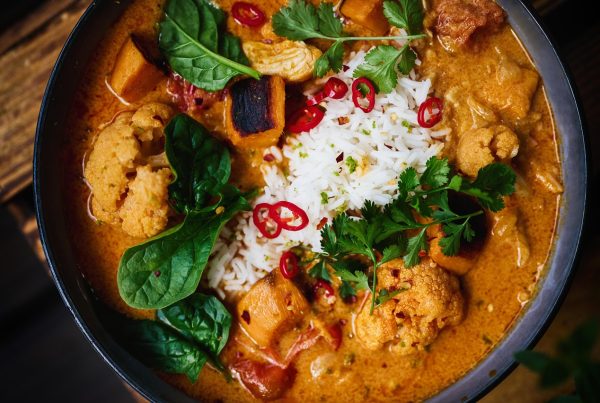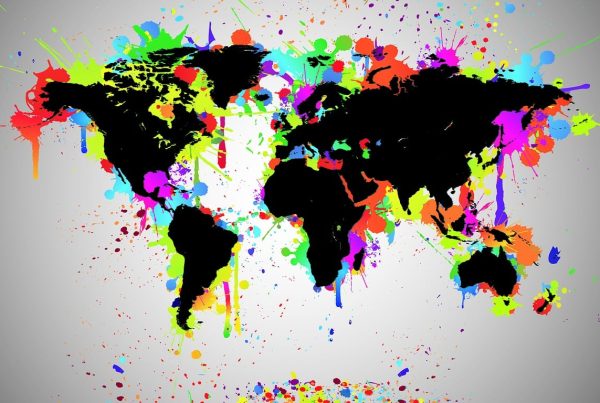The choral anthem Land of Hope and Glory has been synonymous with British pride and power ever since it was composed by Edward Elgar (music) and A. C. Benson (words) back in 1901 for the coronation of Edward VII. Its rousing martial rhythm and soaring melody conjures images of the Union Jack blowing in the wind above a vast global Empire over which many believed the sun would never set. But is it still relevant today? Cross-cultural writer, Yang-May Ooi, discusses why she adapted the name of this anthem to become the title of her new book, Land of Hope and Curry – An Idea of England.
Land of Hope and Curry – What does My Book Title Mean?
Land of Hope and Glory at the height of the British Empire at the turn of the 20th century expressed Britain’s Idea of itself. And that Idea, I feel, still continued – perhaps continues – its hold on the British psyche long after the reality of world events revealed the dark side of that state of mind.
Here is the chorus:
Land of Hope and Glory, Mother of the Free,
How shall we extol thee, who are born of thee?
Wider still and wider shall thy bounds be set;
God, who made thee mighty, make thee mightier yet,
And Outdated Idea of Britain
The Idea of Britain in these lyrics proclaims the British as a people born free, born of hope, born of glory. Their native land extended its boundaries wider and wider over centuries to encompass a quarter of the world – and could still envelop the rest of the globe. And they have achieved all this because God is on their side. God made this land of the Britons mighty, and the singing masses invoke – or perhaps even command – this all powerful deity to make them mightier and mightier still till, it is implied, all the world belongs to them.
Land of Hope and Glory was often wheeled out for all manner of grand British occasions involving much pomp and circumstance, including the coronation of Queen Elizabeth II in 1953 – even as the Empire was beginning to disintegrate.
Throughout the 20th century, it was played regularly at The Last Night of the Proms, which was televised across the British nation. The Proms is an annual festival of music created in the late Victorian era to bring classical music to the common folk. The Last Night famously for most of its existence featured rousing patriotic pieces like Land of Hope and Glory, Rule Britannia and Jerusalem with everyone at the Albert Hall singing along with great gusto and strong feeling.
In modern times, as we can see from the chorus of Land of Hope and Glory, such anthems from the height of the British Empire are controversial for their message of jingoism, imperialism and maybe even racism.
But in spite of myself, while deploring the words, I have to confess the tunes are very rousing! I can’t help myself when I hear them – I just want to sing along and move my arms like a marching majorette in time to the music. The music makes me feel pride in being British even while the lyrics make me shudder in horror.
Multi-cultural Britain
Since those imperial days, Britain has become a multi-cultural nation and connected to its former colonies in a more democratic spirit through the Commonwealth. Alongside English, Welsh and Scots Britons, we have Asian and East Asian entrepreneurs and politicians contributing to the wealth and well-being of the country. The NHS employs doctors, nurses and other specialists from both British and international pools of talent. Among the staff of private businesses are Europeans, peoples from the Americas, Africa, Asia and the Antipodes. All manner of varied indigenous and diverse cultural festivals and holidays are celebrated. In most towns and cities, we can find an array of food from local cuisines and those from across the world – Nigerian, Malaysian, Italian, Georgian, Chinese, Tibetan, Afghani, Indian and more.
All these diverse people and their cultures generally live happily and with ease alongside the “indigenous natives” of this island nation. Despite the ruckus stirred up in the media and among a minority of angry people around anti-migrant feeling, my sense is that most British people get along with each other most of the time whatever their background and origin.
I like to think that this multi-culturalism can be symbolised in one thing. The national dish of Britain.
It is not roast beef or even fish and chips (which actually has Jewish origins, but that’s for another article) – but Chicken Tikka Masala. CTM, as it is popularly known, is said to have been created by a Pakistani-Scots chef, Ali Ahmed Aslam and is an adaptation of South Asian dish to suit British palates – though this is disputed by some and there are other contenders for the honour. Whoever was the inventor of it, the dish became recognised as Britain’s national dish when Robin Cook, the then Foreign Secretary, declared it so in 2001.
So the title of my book Land of Hope and Curry – An Idea of England came to me in a flash when I was thinking about how to capture the story of Britain’s journey from an arrogant, jingoistic imperial power to a more equal, democratic and diverse nation in the post-colonial period.
What to do about the Past?
Do we confine the likes of Land of Hope and Glory to the dustbin of history for being outdated imperialistic vainglory? Or do we need to keep it as an aspect of British culture that is dear to the nation’s heart – and if we do, how do we also recognise within it the damaging history that affected the people from ex-colonies who are now part of this nation as much as the indigenous natives?
The Proms have tried to do this by playing an orchestral version rather than a choral one – ie. the message being “enjoy the music but no singing along, please, to the unpleasant words.” But just the music itself still does goad you to vocalise something. You can’t just sit there silently in the face of its rousing rallying call. Could we, I guess, make do with “Land of Hooope and Gloory… la-la lala la laaaa..” Or might we commission someone to compose some different and new lyrics that might resonate with our modern values of diversity, equality and the spirit of “hands across the sea”?
Proud to be a Modern Briton
I am proud to be British. I want to feel this pride without guilt and I want to express this pride without being made to feel bad about it.
I am proud of the British values that make modern Britain. Like free speech – though I fear that that is being eroded by some current issues where debate seems to be shut down. Like kindness and tolerance – though there are those who seem to prefer anger and hate. Like good manners – though I worry that that seems to be fading in a digital culture. Like the separation of church, state and the judiciary. A free press. Democratic and free elections. The rule of law.
And finally and most significantly, I am proud to be part of a diverse, multi-ethnic, multicultural Britain.
There will be some who will immediately be able to find an example to counter all of these things on my list. I can hear those comments now… We don’t have a free press because the BBC is biased in favour of X. The rule of law is a joke, look at the injustice of the Y case. And look at all those people who have racist views and are anti-immigration…
That, too, is one of the British values I am proud of. The right to hold an opinion and to disagree with another who also has an equal right to hold their own opinion – without wanting their death or mutilation or making that disagreement personal. And the open discussion around difficult issues that emerges from such disagreements.
Courage – a Very British Value
And actually, the hand-wringing and anxiety in recent decades around Empire and Britain’s tarnished past is part of what makes me proud to be British. It takes courage to look at the dark side of ourselves. The debate around how to deal with Land of Hope and Glory at the Proms is, for me, exactly one of those “proud to be British” moments – by the simple fact of the public debate taking place in response to protests indicates openness to protest and to self-reflection. And that public debate, whatever the outcome of that particular specific issue, will lead to further debates that are essential in a free and democratic nation that aims to champion equality and diversity.
My sense is that the current debates around Imperial Britain’s role may be painful and arouse uncomfortable feelings of shame but they are essential and valuable. Facing the shame of what was done in the past with that other British value, courage, can lay the foundation for the future – for the kind of nation we want to be.
I would like to see a way that we can all be proud to be British that is not martial or imperialistic or requires the subjugation of other or our own peoples. There is a huge deal to be proud of that resonates with our modern, democratic and diverse values as I have touched on – and I would also love to see more qualities, actions and policies emerge that we can feel even more swelling pride in. Such as the cleaning up of corruption, the dismantling of institutional racism, improving the NHS and public services and more – I am sure you have your own list of things that would “make Britain great again” or “make Britain even greater” depending on where you are on the spectrum of Britain’s greatness, or not!
More Questions
The title of my book Land of Hope and Curry – An Idea of England is my attempt to wrap into a single motif this complex sense of pride and shame, patriotism and internationalism, belonging and migration, certainty and doubt, personal and universal. And I will be exploring in more detail in the book the questions and challenges I’ve touched on here in this article.
Land of Hope and Curry – An Idea of England will be published by River Light Press in 2026.








